Throughout the current Al-Aqsa crisis, PA President Mahmoud 'Abbas has maintained a relatively restrained tone in his statements outlining the PA's position. He stressed that "[East] Jerusalem is Palestinian," and that the struggle is not just about removing the security measures at the Al-Aqsa Mosque compound, but is a broader struggle for sovereignty over and control of the area. He praised the steadfastness of the Palestinian people and expressed support for their actions, but took care not to openly call for escalation. However, statements by senior Fatah officials show a different picture; according to them, 'Abbas has ordered an escalation of the struggle.
After the removal of the security measures on July 27, 2017, 'Abbas issued a directive, following the guidance of the religious leadership, that prayers at Al-Aqsa resume, but refrained from calling for calm and even stressed that the struggle would continue. A statement by the Palestinian foreign minister said that the struggle would continue until the situation at Al-Aqsa returned to what it was before 1967 – that is, prior to the instatement of Israeli sovereignty in East Jerusalem. Palestinian officials called on the people to come to the mosque "in order to cement the achievement."
The following are excerpts from official Palestinian statements on the Al-Aqsa crisis in the last few days.
Increasingly Strident PA Statements Prior To Removal Of Security Measures
As stated, throughout the crisis 'Abbas stressed the Palestinian sovereignty in Jerusalem. In a July 25, 2017 meeting of the PLO Executive Committee and Fatah Central Committee in Ramallah, 'Abbas said: "Jerusalem is ours. It is our capital and our sovereignty. As long as the situation in occupied Jerusalem does not return to what it was before July 14, there will be no changes [in our position]." He called for Israel to remove all the security measures introduced since that date, reiterating that "only then will things return to normal in occupied Jerusalem." Praising the Arab residents of Jerusalem, he added: "What you did was defend your honor, your religion and your holy sites. It was the true answer to those who wish to harm our holy sites and the principles of our faith. We supported you in what you did and are [still] doing. We decided to suspend the security coordination; [that decision] still holds. We [decided to] defend the holy sites; that still holds as well. We [now] want to review everything that has happened from [July 14] until today, in order to decide what to do [next]."[1]
However, this brief statement apparently does not reflect the decisions taken at the meeting. A report on Fatah's official Facebook page indicated that a decision had been taken at the meeting to escalate the struggle: "After the meeting held tonight to discuss the developments regarding Al-Aqsa, the Fatah Central Committee called on the masses in all the Palestinian territories to escalate the popular [protests] and hold Friday prayers in all the squares..."[2]
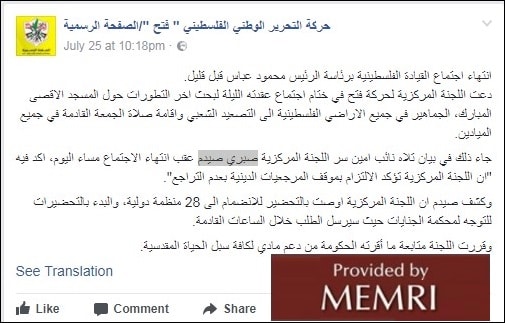
A July 26 post on Fatah's Facebook page openly called for escalation, stating: "Following a meeting of the national and Islamic action groups at the office of Fatah Deputy Chairman Mahmoud Al-'Aloul, attended by Fatah Central Committee members Jamal Muhaisen and Tawfiq Al-Tirawi, and following a meeting of Fatah branch secretaries in the West Bank, the national and Islamic action groups in Palestine call to hold Friday prayers in the public squares, to mobilize [the public] at large and to hold escalating protests against the occupation throughout Palestine in support for Al-Aqsa."[3]
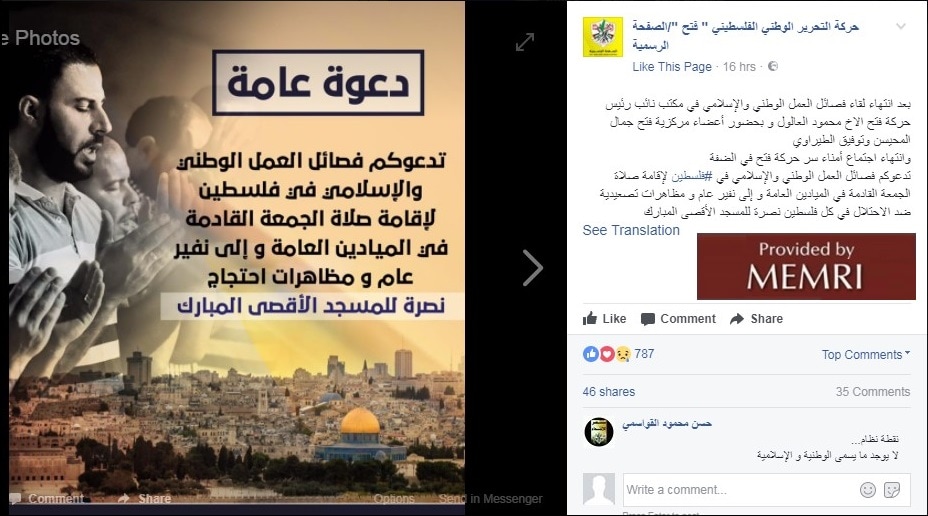
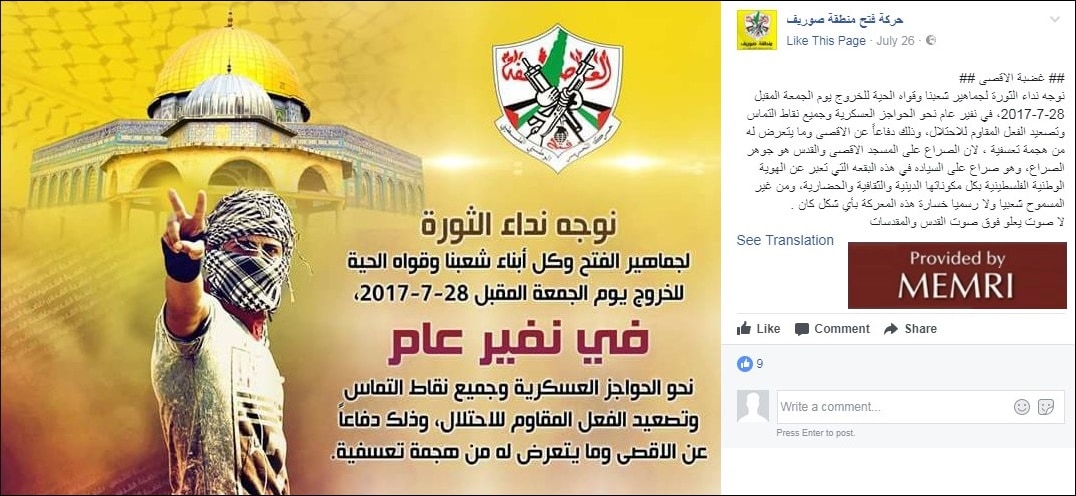
Fatah notice calling for "general mobilization" on Friday, July 28, 2017 urges Palestinians to march on the checkpoints and "escalate action to resist the occupation" (Facebook.com/soriffateh, July 26, 2017)
Fatah Central Committee member 'Abbas Zaki said following the Palestinian leadership's decision to step up the protests: "We Palestinians should be the ones searching the Jews at the entrances to Al-Aqsa, not the other way around."[4]
A statement issued by the PA foreign ministry on July 26, 2017, after the partial removal of the security measures, took a harsh tone, stating that since U.S. President Donald Trump took office the Israeli government has escalated its aggression toward the Palestinian people and its rights. The statement asked whether Netanyahu would "continue dividing Al-Aqsa before constructing the false [Jewish] temple over it, or would adopt a new tactic." The ministry urged the Palestinians to be patient yet determined: "We must not celebrate our victory in the first round of this campaign. We must see it as a first round of many. We are still fighting [Israel's decision to install] smart infra-red cameras that would expose the people to the danger of radiation and also violate their privacy... We must take into consideration that the battle is not yet over. It will never end as long as the occupation continues."[5]
An article by Al-Ayyam columnist Tallal 'Okal also indicated that 'Abbas has decided to escalate the struggle. He wrote: "The Palestinian leadership has raised [its] political position to an unprecedented level [of determination]. After insisting on the ongoing suspension of contacts [with Israel], including the security coordination, President ['Abbas] ordered to escalate the popular resistance in all the areas of friction [with Israel], in addition to other measures, including joining 28 international bodies and appealing to [the International Criminal Court] in the Hague." 'Okal stressed: "The Palestinians cannot accept half measures. The choice is between black and white. Either Israel revokes all its measures, or there will be an all-out confrontation. If Israel is unable to remove all the measures it has imposed because this would mean admitting a great defeat, which it cannot tolerate, the situation will escalate into an open struggle..." 'Okal threatened there will be no forgiveness for Arab or Islamic regimes that fail to act in the matter, and that "it is not inconceivable that the ongoing and escalating struggle will cause some of the wobbling thrones to become even more unstable..."[6]
Islamic Jihad movement members praised 'Abbas's position on the crisis. Khaled Al-Battash, of the movement's political leadership, said: "The position of our men in Jerusalem reflects general consensus on the part of the PA president, Hamas, Fatah, Islamic Jihad, and all of our people. We welcome 'Abbas's statements on Jerusalem. These are steps in the right direction. This is what we have wanted to hear from him for many years, and we hope he continues in this way."
Islamic Jihad movement members praised 'Abbas's position on the crisis. Khaled Al-Battash, of the movement's political leadership, said: "The position of our men in Jerusalem reflects general consensus on the part of the PA president, Hamas, Fatah, Islamic Jihad, and all of our people. We welcome 'Abbas's statements on Jerusalem. These are steps in the right direction. This is what we have wanted to hear from him for many years, and we hope he continues in this way."[7]
Article In PA Daily Praises Home Town Of Halamish Attacker
A harsher tone was evident also in an article by Bassam Barhoum in the Al-Hayat Al-Jadida daily that praised the village of Kobar, home town of Omar Al-Abed, the man who stabbed three Israelis to death and wounded another in their home in Halamish on the evening of July 21. Under the headline "Kobar Creates Glory," the article stated that Al-Abed had carried out the attack "after feeling great anger" at what was going on in Jerusalem: "The village of Kobar is today shaping its glory by means of its steadfastness, provocation, and stand against [Israel]. For the past week, Kobar has known no sleep or tranquility, after young Omar Al-Abed felt great anger in light of what is happening at Al-Aqsa and in Jerusalem and carried out an operation in the settlement of Halamish on Friday... The sons of the village [include also] Marwan Al-Barghouti – Fatah Central Committee member – as well as Fakhri and Nael Al-Barghouti [terrorists released in the Shalit prisoner exchange deal] – the most veteran prisoners who were held in the Israeli prison for over 34 years, along with a prisoner who was expelled to the Gaza Strip, Jasser Al-Barghouti. During the intifadas of the Palestinian people against the occupation, 15 martyrs were from the village of Kobar, as were dozens who were wounded, and hundreds of prisoners... Kobar stands fast against the occupation and today is shaping its special national ethos and writing an illuminated page in the history of the national Palestinian struggle..."[8]
'Abbas Following Removal Of Security Measures: Prayers At Al-Aqsa Will Resume, But The Story Isn't Over
Israel's removal of the security measures, on the evening of July 27, was perceived by the Palestinians as a victory and as a cementing of Palestinian sovereignty over the Al-Aqsa compound, where Palestinian flags were flown.
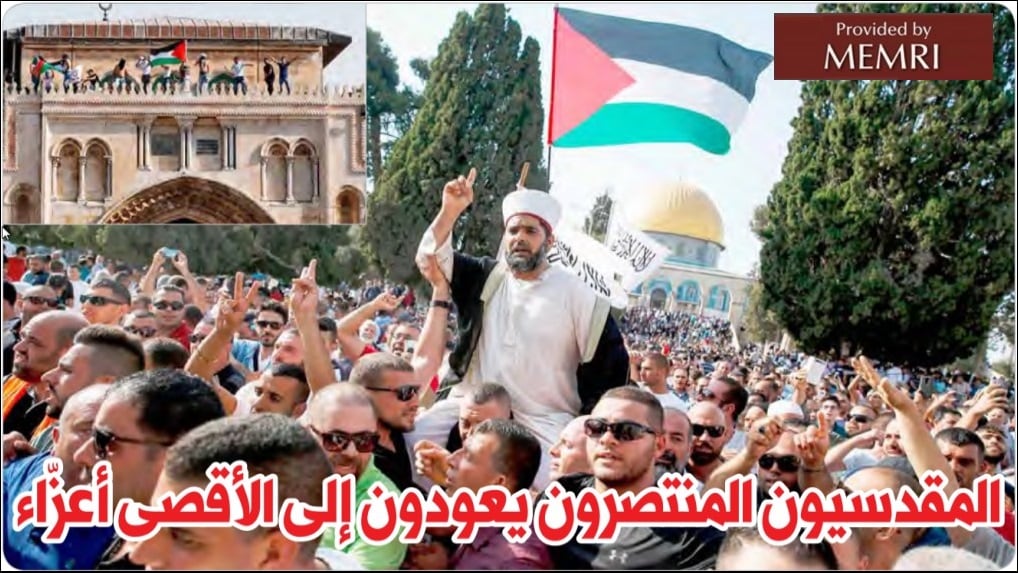
On the July 28, 2017 front page of the PA daily Al-Ayyam: "The Triumphant Jerusalemites Return To Al-Aqsa Unvanquished!"
At a meeting of the Palestinian leadership convened following the removal of the security measures on July 27, 2017, 'Abbas praised the Palestinian position but did not call to calm the situation. He said: "Christians and Muslims, our first thanks go to Allah and then to [your] staunch position and steadfastness in defense of the holy sites so that truth will reign and falsehood will be eliminated." He emphasized that "all the decisions, especially those of the government, will continue to be implemented as before, because what concerns us is supporting our [Palestinian] people and their steadfast [adherence] to their land, homes, homeland and Jerusalem... In light of what happens [next] in Jerusalem we will continue debating our future positions. In other words, it's not over yet. When we decided to suspend the security coordination, we said it was because of several factors, including Al-Aqsa. [But] there are [also] other factors we must discuss and examine, and this will determine our decision." As for resuming prayers at Al-Aqsa, 'Abbas said this was a matter for the religious leadership to decide, and added: "Today there isn't much to discuss. [Right now] we will only discuss the prayer to be held in Al-Aqsa today [July 27]. Later the leadership will convene and decide on the other pending issues... There are many issues. Things will remain as they are until we decide what to do." He concluded: "Today the prayer will be held inside the mosque, and later we will proceed step by step. The affair is not yet over."[9]
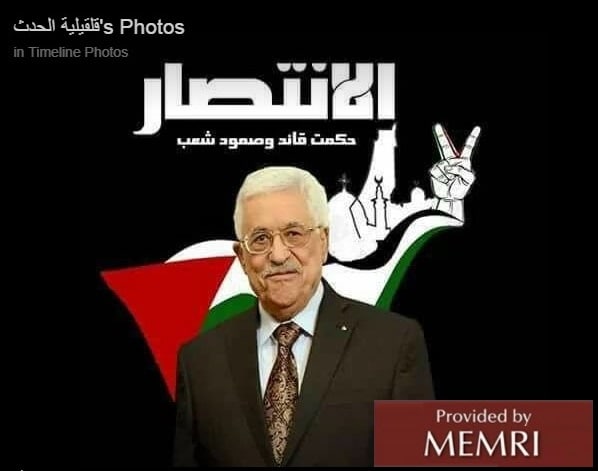
Post on Palestinian news website: "The leader's wisdom and the people's steadfastness" (qalqilya.alhadath.com, July 27, 2017)
Palestinian Foreign Ministry: We Should Learn From This Struggle Until We Restore The Legal Status Quo That Held At Al-Aqsa Before 1967
The Palestinian foreign ministry called to implement the lessons of this struggle in future campaigns for Jerusalem "until the historical legal status quo that held at Al-Aqsa before 1967 is restored." Its statement described the current achievement as "a real opportunity that should form a basis for further achievements in Al-Aqsa and occupied East Jerusalem," and added: "We should learn from the popular momentum which was a great cry of defiance in the face of the occupation authorities... [This momentum] should be a source of inspiration for us in the next stage of our activity... and a model for emulation in our future campaigns for Jerusalem and the holy sites, chief of them the blessed Al-Aqsa... The Palestinians must be alert and draw lessons [from what happened] in order to preserve the achievement and build upon it until the historical legal status quo that held at Al-Aqsa before 1967 is restored in full."[10]
At a July 27, 2017 emergency meeting of the Arab foreign ministers in Cairo to discuss the Al-Aqsa crisis, Palestinian Foreign Minister Riyadh Al-Maliki said: "The campaign in Jerusalem has begun, but it will end only with the removal of the Israeli occupation. For 50 years Israel has been trying to impose its sovereignty in Jerusalem, but yesterday the Al-Quds Campaign proved that these efforts have failed... The people of Jerusalem declared: Jerusalem and the holy sites are ours. [Jerusalem] is our capital... With their staunchness and steadfastness on the front, the people of Jerusalem refuted the false slogans that Israel has composed and sung over the years, and the false claim that united Jerusalem is the capital of Israel and that what [they] call Temple Mount is under Israeli control... Metal detectors and cameras are not the issue. The issue is who is in control and who is the sovereign in Al-Aqsa... The people of Jerusalem will continue to be on alert, ready to defend the sites holy to Islam and Christianity... From the very first moment, the leadership, headed by Mahmoud 'Abbas, took firm decisions and measures that corresponded to the demands of the Palestinian people who stand on the front lines in Jerusalem and [to the demands of the people's] spiritual leadership..."[11]
At a press conference following the meeting, Al-Maliki said that Israel would be responsible for any escalation on Friday: 'We will hold Israel responsible for any escalation before or during the Friday prayer. We will try to protect the lives of the people as much as possible in the face of such escalation..."[12]
Palestinian government spokesman Yousuf Al-Mahmoud said: "[Our] entrance into Al-Aqsa today is an immense historic event that paves the way to liberation and surely heralds the imminent collapse of the Israeli occupation. The government congratulates and appreciates our people's glorious martyrs." He added: "The campaign for Al-Aqsa is a campaign for sovereignty over Jerusalem." He called to unite the ranks in order to "complete the path of struggle until the occupation ends and we realize the dream of establishing an independent state on the June 4 [1967] borders with Arab Jerusalem as its capital."[13]
The calls to come to Al-Aqsa continued even after the removal of the security measures. PA Endowments Minister Yousuf Ida'is called on Palestinians to come to the prayer en masse, on Friday and the days following it, in order to "cement what the people of Jerusalem achieved through their steadfastness and popular resistance." He said further that this achievement demonstrates the Palestinian people's ability to "forcefully seize their right to sovereignty in Jerusalem at large and in Al-Aqsa in particular," and has proved that "the holy sites, chief of them Al-Aqsa, belong to nobody but the Muslims."[14]
The Bureau of Islamic Endowments ordered all mosques in Jerusalem except for Al-Aqsa closed on Friday and that all worshippers come to Al-Aqsa.[15] Former Jerusalem mufti Ikrama Sabri, who preaches at Al-Aqsa, explained that the reason for this was that the Friday prayer at Al-Aqsa should be a "general mobilization of Muslims to save Al-Aqsa."[16]
[1] Qudsn.ps, July 25, 2017.
[2] Facebook.com/officialfateh1965, July 25, 2017.
[3] Facebook.com/officialfateh1965, July 26, 2017.
[4] Samanews.ps, July 26, 2017.
[5] Al-Hayat Al-Jadida (PA), July 27, 2017.
[6] Al-Ayyam (PA), July 27, 2017.
[7] Palestinian TV, July 25, 2017.
[8] Al-Hayat Al-Jadida (PA), July 27, 2017.
[9] Al-Hayat Al-Jadida (PA), July 28, 2017.
[10] Facebook.com/wafagency, July 27, 2017.
[11] Facebook.com/wafagency, July 27, 2017.
[12] Wafa.ps, July 27, 2017.
[13] Wafa.ps, July 27, 2017.
[14] Wafa.ps, July 27, 2017.
[15] Al-Ayyam (PA), July 28, 2017.
[16] Masrawy.com, July 27, 2017.





